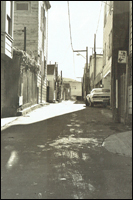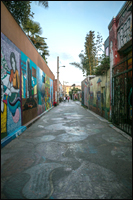Three years ago, Kim Shuck thought that everyone knew the alarming rate at which Indigenous American women go missing in the United States and just weren’t doing anything about it.
“When I found out that people actually didn’t know, it made me wonder what was going on in their communities that I don’t know about,” said Shuck, San Francisco’s seventh poet laureate (2017-20). “How do you find out about things that aren’t reported from particular perspectives? By talking to each other.”
The ensuing conversation is also an art project.
“Manifest Differently” is a multigenre, multivenue project featuring fine art, poetry and panel discussions that respond to the foundational history of settler colonialism and white supremacy in the United States and beyond. It asks how the future can be different.
The brainchild of Shuck and Megan Wilson — co-director of Clarion Alley Mural Project — and co-curated by Trisha Lagaso Goldberg, “Manifest Differently” includes 38 visual artists and poets, many of whom are Indigenous Americans. It spans several locations throughout The City, including Clarion Alley — where CAMP has maintained a steady rotation of murals in the heart of the Mission District since 1992 — to the San Francisco Public Library. The project began in September and continues through April.
The latest installment is a visual art exhibition at Minnesota Street Project in the Dogpatch. It fills the building’s two-floor atrium with paintings and murals, each offering an example of what it means to “manifest differently.” The spirit of protest art as murals, poetry and books fills its second-floor space.
Wilson’s own “Broken (18 California Treaties),” made in collaboration with López Custom Workroom, features 18 textiles, each featuring text from a different treaty that Indigenous Californians were forced to sign by the United States government between 1851 and 1852, relinquishing rights to their land in exchange for designated land reservations and goods. As the title suggests, these treaties were broken.
“It’s never too late to apologize,” Wilson writes, “to make reparations, to give land back, and to make peace.”










